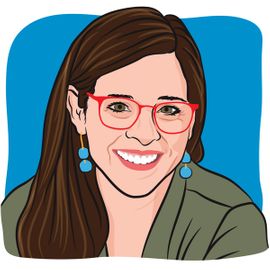- About Us
- Advertise / Support
- Editorial Board
- Contact Us
- CancerNetwork.com
- TargetedOnc.com
- OncLive.com
- OncNursingNews.com
- Terms & Conditions
- Privacy
- Do Not Sell My Information
- Washington My Health My Data
© 2025 MJH Life Sciences™ and CURE - Oncology & Cancer News for Patients & Caregivers. All rights reserved.
Aging Out of AYA Cancer Survivorship

Danielle Ripley-Burgess is a 20+ year colon cancer survivor first diagnosed at age 17, an award-winning communications professional and the author of Blush: How I barely survived 17. She writes and speaks to encourage others that faith can survive. Also, she bakes a really good chocolate chip cookie. Follow her blog at DanielleRipleyBurgess.com or connect on social media at @DanielleisB.
I was diagnosed with colon cancer at 17, and while I’ll always be part of the AYA community, turning 40 has shown me the gift of growing older.
I’ve walked through an odd experience over the past few years. I was 17 years old when I was first diagnosed with colorectal cancer, which makes me an adolescent and young adult (AYA) cancer survivor. The topics that often arise for AYA patients — fertility, career/job, genetics, financial toxicity—have heavily influenced my life. I’m an adoptive mom because of cancer. I found a passion for the communications profession and a path to advocacy because of my disease. Having Lynch syndrome puts me at a higher risk of multiple cancers, so both my schedule and my budget have revolved around screening, check-ups, and follow-ups for the last two decades.
Many AYA patients compare their lives with peers who are attending class, building their careers, traveling the world, having babies, getting married, mindlessly eating cheap take-out, and drinking on the weekends. This makes us realize what a thief cancer can be. I’ve been in this boat for 20 years, that is until the past few years. What happened? I turned 40.
The label of AYA cancer applies to patients diagnosed between ages 15 and 39. The AYA community is quick to say, “Once AYA, always AYA,” and especially because there are unique long-term side effects and challenges that need to be monitored and addressed throughout your lifetime. But once you hit that 40th birthday, something begins to shift. Sure, you’re still an AYA survivor, but you’re one of the oldest in the room. It’s an odd feeling because you’re used to being one of the youngest. It’s like you’re in a space where everyone insists you belong, but you’re unsure if you should take a seat. It feels like the younger people should sit down before you, those who are in the throes of dealing with everything AYA cancer brings.
I’m not dealing with those things anymore. I’m out of school, and I rarely attend weddings or baby showers. My friends and I are focused on eating whole foods and protein–several have stopped drinking. I wrote a book to process my cancer story, and my doctor’s appointments follow predictable routines. My high school classmates are now reaching the screening age for colorectal cancer. I personally need yearly mammograms. If someone my age gets cancer, it’s still considered relatively young, but it’s not as shocking as someone 20 years younger than me. I try to stay relevant and understand the trends (I am parenting a teenager), but I’ve accepted that I’m a millennial, and therefore, I’m “old.” I still don’t really understand what “6-7” means although it’s been explained to me multiple times, and I get lost in the TikTok feeds and stick with Instagram.
And truthfully, I kind of love this. It’s what I fought for as an AYA patient — the chance to grow old. The opportunity to cover my grays and care about wrinkles. The concern over perimenopause and retirement savings. It also comforts me that I’m not alone. Years ago, I found a group of fellow AYA survivors through The Colon Club, and many were five, 10, sometimes 15 years older than me–yet they’d all been diagnosed “too young.” We formed bonds through our grassroots advocacy and storytelling. But over time, many of them moved on to focus on other things — raising their families, building careers, engaging in their local communities. In a way, they “passed the torch to me,” although I insisted they stay engaged. Yet as I’m now stepping into their footsteps, I get it. Because my torch-passing has begun too.
And I think that’s what I’m realizing the key role of an AYA is and always will be. It’s creating communities where we find one another so we can grow and heal. It’s being vulnerable and sharing life. And then it’s thriving when our treatments are effective and our cancer is either cured or put into maintenance mode. It’s modeling how to hang onto survivorship while also letting go of it a little bit, knowing that it will never fully leave you and that there are always ways to advocate. It’s being ok with “aging out,” of being a young adult, knowing that moving on and getting older is pretty dang inspiring.
This piece reflects the author’s personal experience and perspective. For medical advice, please consult your health care provider.
For more news on cancer updates, research and education, don’t forget to subscribe to CURE®’s newsletters here.
Related Content:



